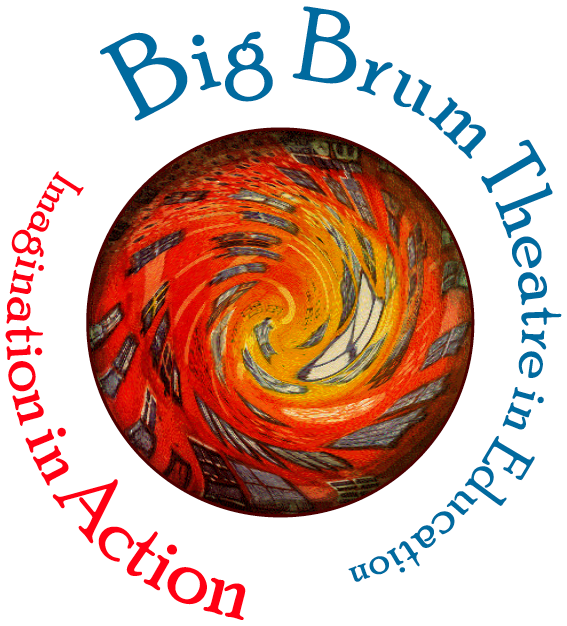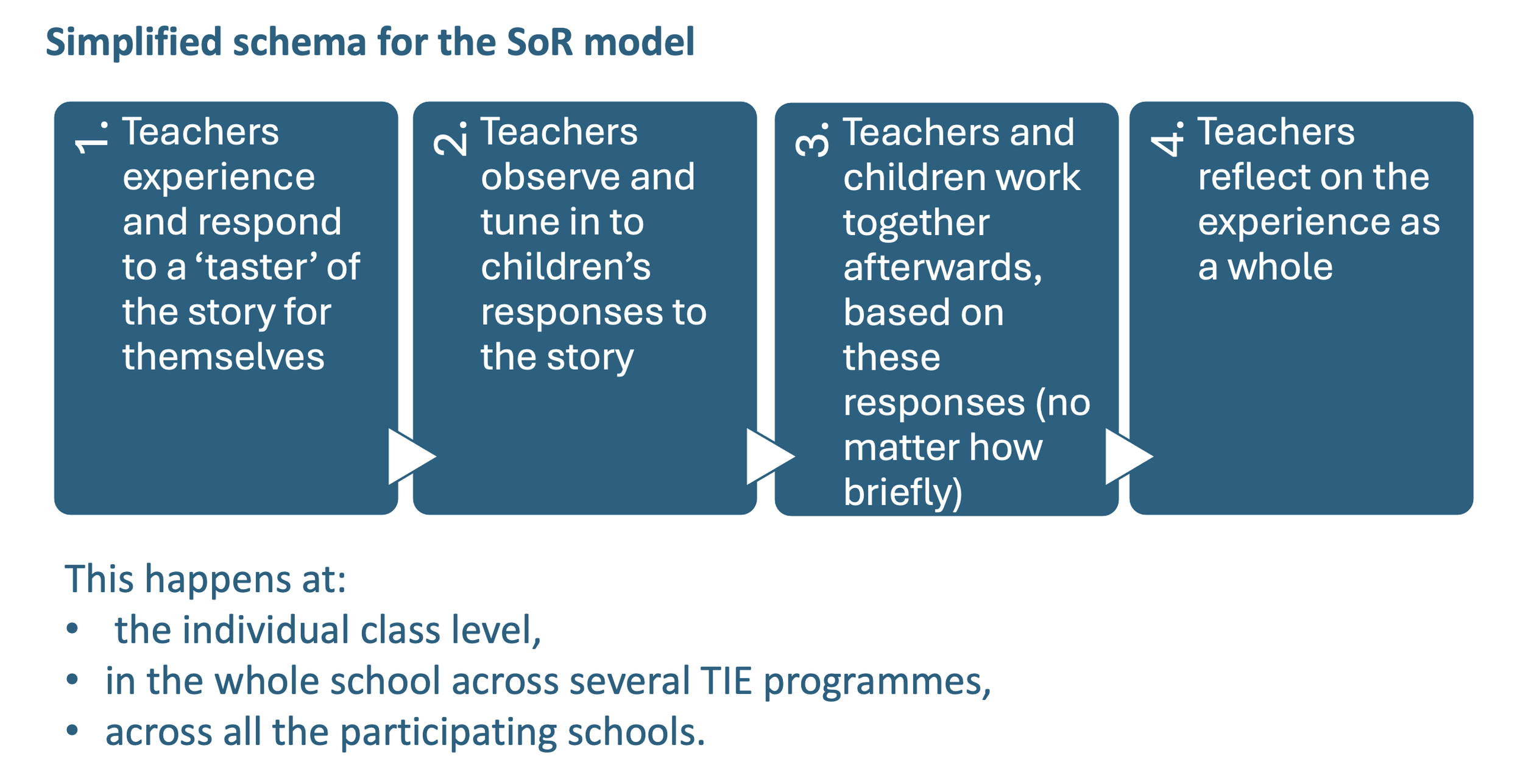Creating ‘Schools of Recovery’
The project story
“Drama, theatre and the imagination in action are what help us to understand what it means to be human, and it is through the other- character, situation, dramatic world- that we can come to know ourselves. This is important to note as this drives to the core of the … project itself.” - Dr Chris Bolton
In June 2024, the people involved in this project gathered at The STEAMhouse, Birmingham for a sharing that took them through the experience of the project since its inception in January 2022. Parts of the event were captured on film.
From the pandemic …
Creating ‘Schools of Recovery’ grew out of Big Brum’s experiences during the 2020-21 lockdowns. The Covid-19 pandemic aggravated and worried at existing faultlines in our schools and communities, exposing dissonances and inequalities, and creating a widespread sense of malaise, anxiety and instability.
As teachers and children began to cautiously return to school from the first lockdowns, the language of ‘recovery’ began to be widely used. For some, this was especially about a return to ‘the new normal’, about catching up on studies and rebooting the economy. For others, there was a recognition that the fractures that had been exposed by the pandemic should not so easily be glossed over: that real trauma and damage had occurred and that real recovery might take a long time and a great deal of care.
As successive waves of fresh crises broke over the schools and communities still struggling with the aftermath of Covid, it became clear to Big Brum that ‘recovery’ was going to need creativity, imagination, care and a great deal of time. As so often, the impacts of these successive crises were being felt most acutely by those who were already most vulnerable and least well-protected, including the young. We recognised that this situation would require a significant rethink for ourselves and for the way we engaged with those around us.
Developing a model
During lockdown, Big Brum had begun experimenting with film-making and digital Theatre in Education programmes, especially the Monodrama ‘Socially Distant’ (Cooper, 2020). We used a version of this programme to create a model where primary teachers could experience the feelings and concepts of our artistic work for themselves before we brought it to their children. We then invited them to ‘tune in’ to the children’s experience of the work … and to follow it up with the children in school as they felt most appropriate. We tested the model at Benson Community Primary School, with a single year group, in the very first days after children returned to school … and it proved to be a tremendously powerful approach.
But what if we were to upscale this model to a whole primary school? What would the impacts then be? Might it have a similarly powerful affect, not only on the individual children and their teachers, but on the whole school culture … and perhaps the community beyond its gates? And what if we were to do this not just with one inner-city school, but with several schools in levelling-up areas and other places facing significant socio-economic deprivation within the West Midlands (the very places most in need of support in their ‘recovery’)?
We took this proposal to the Paul Hamlyn Foundation, who responded to it warmly and with enthusiasm. With their support, we then invited a commission of expert evaluators to support us in understanding the impacts and efficacy of the model: on additionally vulnerable groups of children; on teachers; on curriculum and pedagogy; on the community beyond the school gate. The commission members tell us that we have got many things right, but that we are still on a journey; they advise us that there is a significant job still to be done and they suggest some of the things that we, the schools and the others we work with might want to bear in mind as we carry this job out.
For Big Brum, the advice and understanding they offer is not an abstract question. Heartened but challenged by this experience, and by the company’s restoration as an Arts Council England National Portfolio Organisation, we are already beginning to further develop the ‘Schools of Recovery’ model for all twenty schools in North Solihull, one of England’s most socio-economically deprived communities. We believe that this ambitious plan is a little scary but absolutely necessary … and we are determined to learn from our initial partnership with the six West Midlands primary schools to make it work as well as it possibly can.
The Artistic Work
Here are the principal TIE programmes involved in this project.
Romeo and Juliet toured for Y5/6 children in the first year of the project. A digital version was then made available for classes working on ‘Ripped’ in the second year. Chris Cooper’s adaptation of Shakespeare’s tragedy used live theatre with filmed moments to make the story resonate with children’s lives today and ask, “who is responsible for this bloody mess?” Please contact us if you are interested in the digital version.
The Giant’s Embrace was used throughout the project as a stimulus and CPD opportunity for teachers, who went on to use the storybook and film with their children. It was based on a former very popular ‘live’ TIE programme and took the form of an unfinished fairy tale that subtly explored questions about our wants and needs and the difficulty of deferred gratification. Please contact us if you are interested in the storybook, film or related CPD support.
Along the Silk Road (by Chris Cooper) toured to Y5 and Y6 children in Autumn 2022. The play and TIE programme were set in historic China and the UK of today, inviting children to think about whether people say what they mean and mean what they say at a time when narratives were (and still are) bitterly polarised. The statement early in the play, “there is more to value than profit, child,” was used by several schools as a stimulus for exploring values. A teachers’ resource and film will be available soon.
Ripped took the form of a series of workshops for Y5 and Y6 children, created by Richard Holmes and centred on the story of a troubled girl who had ripped a dictionary and placed it outside her headteacher’s office. The children were invited to give advice to the headteacher about how he should best help meet her real needs and wants. In both 2022 and 2023, the programme was used alongside – or as an introduction to – ‘Romeo and Juliet’. To see some of the children’s letters, click here.
Minotaur (by Chris Cooper) used the classic Greek myth to explore what makes a monster, a king, a hero? The programme toured to Y4 children in 2023 as part of a training and work placement for Applied Theatre students at Birmingham City University. This experience informed a further short tour and placement programme in May 2024. A teachers’ resource, storybook and film will be available soon.
Rumpelstiltskin told the classic Grimms’ fairy story to Y3 children, supported by props and a simple stage set. The adaptation, by Richard Holmes, invited the children to think - in an age-appropriate way - about power, property, control and the value of a child’s life. For a report on a session observed by evaluators, click here.

